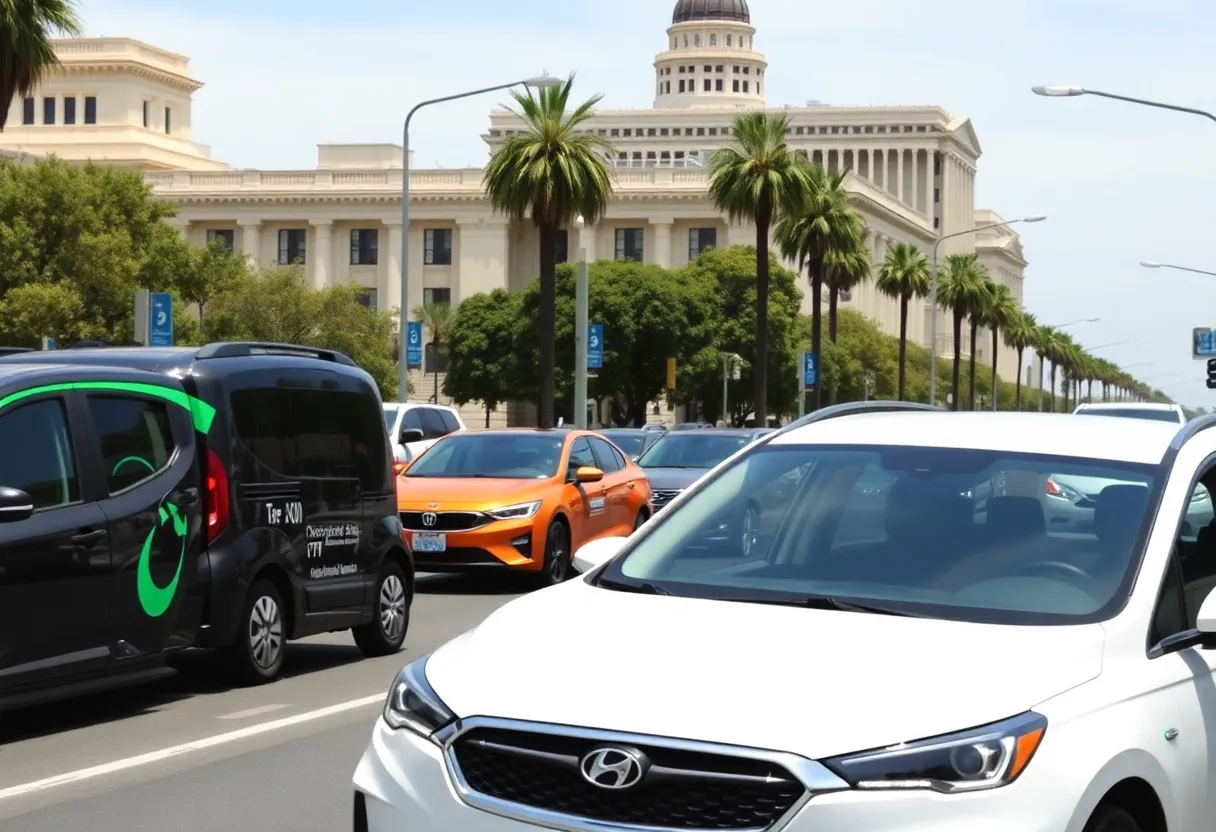News Summary
The U.S. Senate is set to vote on a proposal to lift California’s ban on new gas-powered car sales by 2035, amidst concerns regarding electric vehicle (EV) sales and infrastructure. With major automotive companies like GM pushing back against the state’s EV mandates, consumer sentiment remains cautious. California’s ambitious regulations seek to phase out gas-powered cars, requiring significant increases in zero-emission vehicle sales. Governor Newsom supports the initiative, but political challenges loom as Congress debates possible rollbacks of emissions standards.
California Faces Senate Vote on Gas-Powered Car Ban
The U.S. Senate is preparing to vote next week on a significant proposal that seeks to lift California’s ban on the sale of new gas-powered cars by 2035. This initiative, originally introduced during the Trump administration, comes at a time when electric vehicle (EV) sales in California are reportedly slowing, currently holding steady at around 20% of the auto market share.
Concerns Over Electric Vehicle Sales
General Motors (GM) is actively advocating for the repeal of California’s EV mandate, expressing concerns about the ability of automotive manufacturers to meet the stringent requirements set forth by the state. Brian Maas, President of the California New Car Dealers Association, has raised alarms that manufacturers will struggle to achieve a target of 35% EV sales for next year’s models, urging a pause on the mandate from the California Air Resources Board.
Adding to the concerns, Tesla has witnessed a 12% drop in its market share during the first quarter of the year, a decline that industry analysts partly attribute to ongoing political controversies surrounding its CEO, Elon Musk. If the EV market experiences a collapse, according to California State Senator Henry Stern, there may be a need to reevaluate the state’s zero-emission goals, highlighting fears about the future of American automotive innovation.
Consumer Hesitation
Consumer sentiment towards electric vehicles reflects significant hesitance amidst these developments. Many potential buyers are wary of fully committing to EVs, citing limited charging infrastructure and the convenience of traditional gas-powered vehicles as practical considerations. One prospective buyer mentioned a preference for gas-powered vehicles due to these concerns.
Senate Discussions and Legislative Maneuvering
Senate Majority Leader John Thune (R-S.D.) has indicated that the Senate will discuss three resolutions focused on rolling back California’s stricter emissions standards, including the ban on new gas-powered car sales. California has been granted the authority under the Clean Air Act to establish stricter vehicle emissions regulations, a power that has received support from previous presidential administrations.
Governor Gavin Newsom has been a prominent advocate for California’s regulations, which aim to phase out the sale of new gas-powered cars by 2035 as a measure to combat air pollution. This ambitious initiative requires automakers to incrementally increase the percentage of zero-emission vehicles sold: 43% by 2027, 68% by 2030, and reach a complete transition by 2035. The Biden administration also approved California’s waiver for stricter emissions regulations in December 2022.
Legal and Political Landscape
Republican lawmakers in Congress argue that California’s regulations represent an overreach of federal authority and could hinder consumers and the economy. Any congressional effort to obstruct these emissions standards requires a simple majority vote in both the House and Senate, powered by provisions within the Congressional Review Act.
However, California’s regulations face significant legal challenges, with arguments suggesting they may not be easily overturned under the Congressional Review Act. Governor Newsom and state air regulators have signaled their readiness to pursue legal action to uphold the state’s emissions regulations if Congressional efforts to block them proceed.
Environmental Impact and Infrastructure Concerns
As one of the largest contributors to climate change, pollution from vehicles necessitates immediate action to reduce emissions and improve air quality. Currently, 11 states have aligned with California’s initiative to phase out new gas-powered cars by 2035, but the state’s infrastructure for EV charging remains understaffed. California boasts approximately 84,000 public EV charging stations but requires around 1.2 million by 2030 to meet anticipated demand, raising concerns over the readiness of the state’s electric grid to support a significant influx of electric vehicles.
In light of these challenges, other states, such as Vermont, have paused their own EV sales mandates, citing practical difficulties in enforcement. The ongoing debates illustrate the complexities of transitioning to electric vehicles amid consumer apprehension, regulatory challenges, and infrastructure requirements, ultimately shaping the future of California’s automotive landscape.
Deeper Dive: News & Info About This Topic
- Associated Press: Senate California EPA Vehicle Emission Standards
- Wikipedia: Electric Vehicle
- The Center Square: California’s Vehicle Emission Standards
- Google Search: California gas car ban
- ABC7 News: House Votes Block California’s 2035 Gas Car Ban
- Google Scholar: Vehicle Emission Standards
- CBS News: California Plan for Gas Car Ban
- Encyclopedia Britannica: Air Pollution
- San Jose Spotlight: Senate Republicans on California Gas Car Phase-Out
- Google News: California gas vehicle ban

Author: STAFF HERE HUNTINGTON BEACH
The Huntington Beach Staff Writer represents the experienced team at HEREHuntingtonBeach.com, your go-to source for actionable local news and information in Huntington Beach, Orange County, and beyond. Specializing in "news you can use," we cover essential topics like product reviews for personal and business needs, local business directories, politics, real estate trends, neighborhood insights, and state news affecting the area—with deep expertise drawn from years of dedicated reporting and strong community input, including local press releases and business updates. We deliver top reporting on high-value events such as the Huntington Beach Surf City USA Marathon, the U.S. Open of Surfing, Fourth of July celebrations at the Huntington Beach Pier, and community festivals at Huntington Beach Central Park. Our coverage extends to key organizations like the Huntington Beach Chamber of Commerce and Visit Huntington Beach, plus leading businesses in retail, hospitality, and outdoor recreation that drive the local economy. As part of the broader HERE network, including HEREAnaheim.com, HERECostaMesa.com, HERESantaAna.com, and HERELosAngeles.com, we provide comprehensive, credible insights into Southern California's dynamic landscape.





